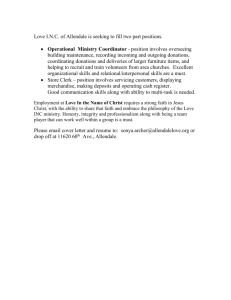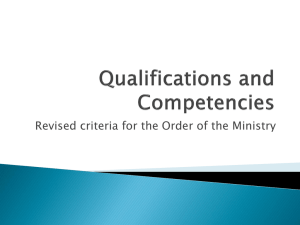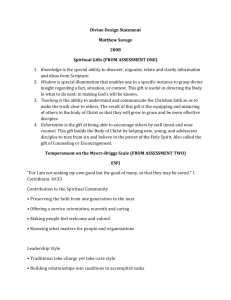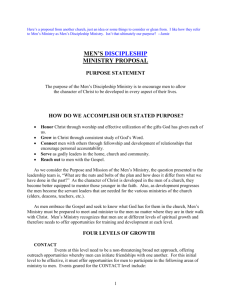Document
advertisement
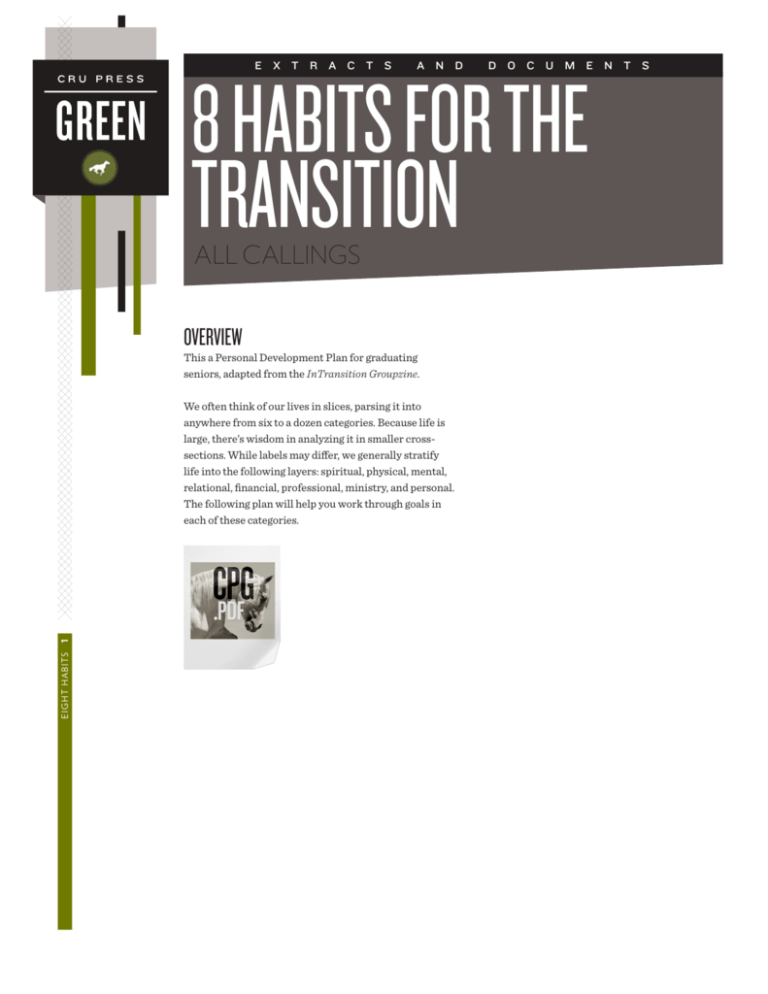
E X T R A C T S A N D D O C U M E N T S 8 HABITS FOR THE TRANSITION ALL CALLINGS OVERVIEW This a Personal Development Plan for graduating seniors, adapted from the InTransition Groupzine. EIG H T HABI TS 1 We often think of our lives in slices, parsing it into anywhere from six to a dozen categories. Because life is large, there’s wisdom in analyzing it in smaller crosssections. While labels may differ, we generally stratify life into the following layers: spiritual, physical, mental, relational, financial, professional, ministry, and personal. The following plan will help you work through goals in each of these categories. Eight Habits 1) Ppersonal development Pplan: Overview Nothing happens in isolation. There’s always a bigger picture. A context that is bigger than the moment itself. For us, that context is Eternity. Heaven. The eighty or so years you may get to spend on this earth are but a small dot on the endless line of eternity. One writer of the Bible put it rather bluntly: “Why, you do not even know what will happen tomorrow. What is your life? You are a mist that appears for a little while and then vanishes” (James 4:14). You won’t find that on a Hallmark card! We often think of our lives in slices, parsing it into anywhere from six to a dozen categories. Because life is large, there’s wisdom in analyzing it in these smaller cross-sections. While labels may differ, we generally tend to stratify life with the following layers: spiritual, physical, mental, relational, financial, professional, ministry, and personal. I think we all would agree that each of these aspects is important for living a well-balanced and healthy lifestyle. So these will be our categories for goal setting as we work through a Personal Development Plan, with the following caveat. We make a grave error if we see our spiritual life as only one piece of the entire pie and miss the point of a life fully surrendered to the Lordship of Christ. To continue to grow spiritually, we must bring each area of our life into relationship with Christ and see through the lens of an eternal perspective. How will your faith affect your relationships or how you choose a marriage partner? How will you live out your faith in an authentic and appropriate way at work? Will God have control of your checkbook? Will you trust Him to guide you with each new career opportunity? In the end, what will last? What will really matter as you step into eternity? It is with this mindset that we’ll approach the writing of a Personal Development Plan. God desires that your whole life glorify Him and for Him to be Lord over every area of our life. assessing the Ttransition: key questions • When you think about graduating, what are some of the first things that come to your mind? • What worries you or concerns you the most as you think about leaving the college environment? • How do you picture yourself serving the Lord and ministering to others after you leave college? • What temptations do you think you could encounter that might distract you in your walk with God? • From a practical standpoint, how are you preparing yourself for the transitions ahead? 2) the mission statement Take a first pass at writing a God-honoring life mission statement. Stephen Covey, in his book 7 Habits of Highly Effective People , says: “To begin with the end in mind is to begin with the image of the end of your life as the frame of reference by which everything else is measured.” The Apostle Paul neared the end of his life with these words: “I have fought the good fight, I have finished the race, I have kept the faith.” (2 Timothy 4:7) In the end, what do you want to be true of your life? Here is a creepy, but helpful, exercise. Imagine what you want people to say about you when you die. In the space below, summarize those thoughts in the form of your own obituary: Rather than just waiting until the end of your life and hoping that you will have somehow made a difference or accomplished something of importance, why not start now with an end in mind? your mission statement Crafting a personal mission statement is one way to gain a clearer vision and purpose for your life. And there are several benefits to taking the time and making the effort to write one: It helps to give purpose to your life It helps you to identify your values and beliefs It helps you to get involved in something greater than yourself It helps you to make wise choices about what you will and will not give your time to It helps guide your decision-making process What am I passionate about? • • • • • • • • • • • • • • If you were asked to create a TV special about something that moves you, what would it be about? What magazines intrigue you most at a newsstand? What sections or articles most catch your attention? If you started a business or organization to solve a need, what would it be? What issue would you like to see someone write a bestselling book about? What biblical passages has God used deeply in your life? How have the passages shaped your view of life and the world? What ignites the passion of your life and excites you when you think about doing it for a vocation? What rewarding experiences has God given you that may have been preparation for your future? How has God used you significantly in the past? What are the things that make you feel the most alive when you participate in them? In what ways do you most enjoy giving yourself away to others? Who are the people you find yourself voluntarily getting together with, again and again, for deeper discussions? What are your deepest discussions about? How would you use a gift of a million dollars if it had to be given away to a cause that moves you? Is there any need or problem you believe in so strongly that you’d love to work at it full-time? After answering a few questions like these, you should begin to see a few patterns emerge. These patterns are important. They are keys to the passions and desires that God has placed in your heart. Don’t rush this process too much. Patterns usually emerge and become clearer over time. How these passions get lived out in your life is part of the adventure of walking with God for a lifetime. As best you can, write a short mission statement (in pencil, of course) in the space below: “My mission is to ______________________________________________________________________ _____________________________________________________________________________________ ____________________________________________________________________________” 3) a personal plan for growth God has changed your life and given you a new identity. Isn’t that true? You made a 180-degree turn around. You understood biblical truths for the first time. You gained God’s perspective on your purpose in life. You experienced ways that God could use you in another person’s life. You stepped out in faith and trusted God to see you through challenging situations. Your faith became your own: not just something passed down from your parents or friends. Indeed, God has done something significant, something unexpected, in your life. You may have come to college looking for God. Or not. Either way, He found you. You are not the same. Jesus has drawn you to Himself and He will never let you go. More than likely, God used several catalysts to help in your spiritual growth. Things such as: A small group Bible study A church body A spiritual movement on your campus An older person investing in your life A missions project A conference or retreat speaker A consistent personal study of God’s Word An accountability or prayer partner An opportunity to serve or lead in ministry to others A friend who would never give up on you a quick inventory • Describe, in one to two sentences or phrases, how God has changed your life during your college years: • Based on the list above, place a check mark by anything that helped spur on your spiritual growth during college. • Now, briefly recount which one had the greatest impact on you and why. Do you feel a sense of gratefulness as you remember what God has done for you? Do everything you can to keep this memory fresh. Don’t let it fade away with time. Now that we have taken a quick look back, let’s consider what is about to change. How can your spiritual growth continue as you transition from your college surroundings to a whole new world? the new reality Though there are a few exceptions, most people move to a new city when they graduate from college. This means searching for a new church, establishing new friendships, and finding a new place to serve in ministry. In other words, the spiritual support system that you have experienced during college will be gone. Scattered. New beginnings. And new beginnings take time, effort and commitment. Because of the initiative that you will need to put forth, I believe that it’s important for you to consider your future needs and make some commitments now— before you are dead tired from managing a new job…. and a new everything. how do we grow? Practicing Personal Disciplines (or Habits) Our best relationships require an investment of our time. If a relationship is robbed of time, the people in it will eventually drift apart. It’s an obvious fact in human relationships and the same principles hold true of our intimacy with Christ. Relationships take an investment of our time— which, by the way, will be a precious commodity once you start a full-time job! Think for a moment about how you have (or haven’t) practiced the following disciplines in college. What effect, over time, have they had on your relationship with God? Which have had the greatest impact? • Reading and meditating on the Word • Prayer • Memorizing Scripture • Journaling/reflection time What have you found to be the greatest enemy to spending time with God? (lack of time, lack of desire, feeling as if you get nothing out of it, unconfessed sin, etc….). What have you done to overcome that hindrance? Learning From Others Hebrews 10:24 encourages us to “consider how we may spur one another on toward love and good deeds.” I once heard someone say that if you are going to be spurred on, you have to be around people with spurs on. Where else can you find that except around others committed to following Christ? Make a quick list of everyone you can think of who has ‘spurred you on’ over the last four years (even if it was someone that you never met personally). Next to their name briefly describe how they have done this. What will it take to continue having people like these in your life? Taking Steps of Faith I don’t know about you, but I like comfort and convenience. Taking steps of faith disrupts both comfort and convenience and brings me face to face with my need to depend upon Christ. Jesus said, “apart from Me you can do nothing.” These words remain simply nice words on a page until I get outside of my comfort zone. It’s then that I realize how much I really do need Jesus. Yes, I know that I need Him, but in my flesh, I can become pretty self-sufficient. Taking steps of faith keeps me mindful of my need for Christ. • Think of a time in the past year or two when you had to trust God with something out of your control or out of your comfort zone? How did that help you to grow closer to the Lord? • Where do you want to be spiritually in five, ten, fifteen years? What is your vision for your life in this area? Write a few phrases or sentences to describe that desire: If any of these things have contributed to your spiritual growth during college, they may have been so woven into your environment that you took them for granted. Taking inventory of what helps you to grow spiritually will help you to weave the right elements into your new environment. 4) Ppersonal plan for finances Let’s talk about your money—what little there may be of it. For most college students, this will be a huge transition. Regardless of your starting salary, it might seem like a lot of money compared to what you have been making as a college student. But then there’s the flip side of the coin as well; your expenses are about to change. Whatever your experiences have been, let me assure you that change is on the horizon. Let’s see what it will take to make a Christ-centered transition in this area of your life. Understand what God has to say about money There are so many financial advisors in our country today. The advice is abundant. As you listen to what others say about money, it is important to have a biblical grid through which to evaluate all that you hear. Take inventory of your own beliefs about money When it comes to managing our money, we have all been shaped by the people or environment around us. Some have observed frugality to the point that it hurts. Others have experienced creditors calling the house and wanting bills paid. Some have never had a want in their life. Others have had to work and save to get something they really wanted. Few have been taught how to put their finances under the Lordship of Christ. Even though America is the wealthiest nation in the world, the majority of Christians in America give away only 1-2% of their income—a long way from the biblical concept of a tithe (10%). Learn how to develop and live by a budget Budgeting might initially be seen as a restraint to your freedom. But ask someone who has spent years digging their way out of debt, how much freedom really came from spending whatever they wanted, whenever they wanted. Make a few poor decisions within the first two years out of college, and you could be paying the price for years to come. For those of you who put yourself in the “poor college student” category, you will probably look at the salary you are about to make and feel rich. “Why budget?” you may ask. “How would I spend that much money?” Don’t be fooled. As the income goes up, so do the expenses as well as the expectations of what you “should” own. You can start now by using the sample budget included in this workshop. Learn how to make wise financial decisions for the future Should I buy or rent? Should I pay off my college loan early? Should I save for retirement or pay off my credit card first? Should I save for retirement now, wait until I get a raise? Should I tithe (give away 10%) now or wait until I get more established and settled? These (and more) are common questions. Proverbs 21:5 says that, “The plans of the diligent lead to profit as surely as haste leads to poverty.” It has been said that most people don’t plan to fail; they simply fail to plan. Even if you agree that making a plan is profitable and wise, you might think, “give me a couple of years to get myself established and then I’ll start thinking about a financial plan.” But believe me, developing biblically financial habits during your first year or two out of college will pay huge dividends for many years to come. Don’t put this off! financial self assessment questionnaire • Are you graduating from college with debt? Yes / No • If so, how much in Credit Card Debt ___________ School Loans ____________ Car loan _______________ Other ______________ • Have you made a plan for paying off this debt? _______ If so, briefly describe that plan: • Have you ever lived by a budget? Yes / No • Do you know how to create a budget? Yes / No • Are you in the habit of giving a portion of your income (regardless of how small) to God’s kingdom? • Have you ever studied what the Bible says about money or giving? Yes / No What have you seen modeled? • Who do you know that you would consider wise in the area of managing their money? • What habits have you observed in them that cause you to consider them a good financial steward? • How would you describe your parents’ philosophy of money and of giving? What patterns and habits (good and bad) have they taught or modeled to you? What financial principles do you want to live by? • What family habits would you like to make your own? What habits would you like to change? • List three to five benefits that you can think of for living according to a budget. • Five years from now, what do you hope can be said about your view of money and your patterns of spending, saving and giving? Take time to create a proposed budget. There are many helpful tools online. 5) Pa personal plan for relationships There are relationships in every arena of life: home, work, play, church. All need attention. All have the potential of bringing us great happiness or great sorrow. There is a longing within each of us, a God-given longing, to love and to be loved. And so, relationships, with all of their ups and downs, will always be a part of our lives. I want to ask you to think about what is important to you. What relationships matter the most to you? What do you value? And what will you do to cultivate those relationships—even if it takes a lot of work and effort on your part? Let’s think about four different categories of relationships: family, friends, spiritual community, and dating (or hanging out or courting depending on which term you prefer). What is about to change? Just for starters ….. Family How will becoming financially independent change your relationship with your parents? How will the proximity of where you live in relation to your parents and siblings affect you and your relationship with them? Friends How will living in a different city than your closest friends affect you? What difference will it make? Spiritual Community How will your spiritual community be different from your college experience? Dating How do you think this will change? what do these changes mean for you? Of all the relational changes you are about to face, the changes in your spiritual community may be the greatest. College is such a unique environment where you can find others your age committed to the same things, making it much easier for a tight community to be formed. You are all located in very close proximity. You attend many of the same events. Your lives crisscross in many arenas. In other words, it just doesn’t take a ton of effort on your part to have a community of friends--people who are there for you, who spur you on and encourage you to walk with the Lord. What will you do? Is community important enough for you to seek it out? You know yourself. You know where you are weak. You know where you have struggled in the past. You know what has come close to spiritually derailing you. Don’t fool yourself into thinking that you are immune to these temptations as you leave college. Being connected to a spiritual community of believers will help influence you toward wise decisions. And now a word about dating … I’ll only say one thing about this. Make a decision now about what traits in a mate you consider nonnegotiable. Put it in writing. Share it with one other person. Date, have fun, and keep praying for God to meet your needs. 6) a personal plan for ministry Do you remember the first time that you saw God use you to minister to another person? You may have shared the gospel, met a physical or financial need, taught a biblical truth, pointed someone to Christ through your encouraging words, served behind the scenes, or given leadership to a project. It is amazing and humbling to realize that God can use us—with all of our shortcomings—to be a source of His love and grace toward another person. “For we are God’s workmanship, created in Christ Jesus to do good works, which God prepared in advance for us to do” (Ephesians 2:10) life map A “Life Map” is a helpful tool for guiding you to a place of ministry, surfacing how God has worked in your life, and recognizing how God has used and motivated you. All of which sets a trajectory toward future service. Using the following guide, take some time to think about the significant experiences and people that have made you who you are today. Part One: Life Experience • • • • • Hero’s – Who are the people who have had a significant impact or influence on your life? Hand of God – Describe the most meaningful spiritual experiences in your life starting with when you became a believer. Hard Times – What difficulties, problems or trials have you encountered in your life? High Points – What have been the greatest joys and accomplishments in your life? Heritage – What are some things from your family background that have contributed to who you are today? Part Two: My Hot Buttons Locating your passions often provides a road map to where God may use you. So here are a few “hot button” questions to consider: • What are some things that make you cry? • What makes you angry? • What do you care deeply about? Part Three: Past Ministry Experiences Since it is the actual work of ministry that is the best validation of your gifts, how would you answer these questions? • How have you seen God use you in the past? This is probably something that you enjoyed doing or found great pleasure in being able to do. List everything that you can think of (nothing is too small to be counted). • What have you experienced that you would say probably does not fit within your giftings? What made you come to that conclusion? looking ahead What will it be like to serve in ministry and hold down a full-time job? Because of the demands of a busy life, I believe you must get honest about this question: Is serving in ministry something you are committed to making a priority in your schedule? In serving the body of Christ ….. • this age group interests me the most: • this people group interests me the most: • this area of activity interests me the most: Most of the time, we have to try a variety of ministry opportunities before finding our niche. Be careful of trying to find the perfect fit before jumping into an arena of service. Check out www.allcallings.com to find potential ministry opportunities and teams you can connect with after graduation! 7) so many decisions...how do i decide? You have probably heard it said that the biggest decisions you will ever make concern your Master, your Mate and your Mission. It is true that these decisions will have a huge impact on your life, for the rest of your life. But just because you make those decisions—and even if you make three very good decisions—doesn’t mean that the decision-making chore is complete. I wonder how many decisions we make every day. Most are relatively little decisions. Others are a little bigger. Part of growing up and becoming an adult is taking responsibility for your decisions and choices. The freedom is yours to enjoy. And then, well, the problems, if any, are yours to solve as well. At other times, your decisions may not really create problems, per se, but instead they slowly take you down a road you never intended to travel. How do you make all of these decisions? Where are the answers? Commit this question to memory and use it often. “What is the wisest thing to do?” Not only will asking this question have positive benefits to your character, but it will also have practical implications to your schedule. personal assessment • On a spectrum of “very slow” to “very fast” how would you describe yourself as a decision maker? • What or who tends to influence your decisions the most? • Think of what you would consider to be a bad decision in the past. What led to that poor decision? • When you have made good decisions, what practices did you follow? (These were probably so intuitive that you may have a hard time coming up with an answer. But most likely, you followed some pattern in making your decision or choice.) • What life experiences have you had so far that might influence the way you make decisions? Learning how to make good decisions is often an exercise of trial and error. The important thing is that you are willing to learn from your mistakes. After all, it’s the multitude of small decisions, over time, that will determine whether or not you really are the person you want to be! 8) going to work Make a list of all the jobs you’ve ever had. • What job did you like the most? Why did you look forward to doing to that job? • What was the worst job you ever had? What thoughts were going through your mind as you endured that job? Up until this point, I would say that most of your jobs have been a means to an end. You worked because the job would provide you with something else that you really wanted or needed. As we come to a close in our time together, I’d like to ask you to consider one last thing. Will you do your work, whatever it is, according to the instruction given in 1Corinthians 10:31? “So whether you eat or drink or whatever you do, do it all for the glory of God.” Will you do your job for the glory of God? god’s calling God has called you to your job. Do you believe that? For many years I have watched students wrestle with career and vocational decisions. Granted, there is a lot of pressure to make some decision at this juncture of your life. From my observations, it seems like there is a greater emphasis on “God’s call” for those who have full-time ministry as a vocational option. But does God only “call” people to ministry? Does He not also “call” believers into teaching or medicine or sales or service or whatever? What difference will it make if you view that job, secular or sacred, as “God’s calling” on your life for this time? How will that affect your mindset as you go to work each day? What difference will it make on the bad days – those days when you work with cranky people, temperamental bosses and impossible deadlines? character tests This test is about who you will become over time. It’s about character. Integrity. Honesty. Some describe the true test of character as “who we are when no one is looking.” Some call it integrity and it is a highly esteemed trait in our society today—probably because it is so rare. There is no place where character may be tested more than in the workplace. What examples can you think of that might be considered “character tests”? You probably came up with several signals to alert you to a problem. Let me just highlight a few you might encounter: o Conformity – everyone else is doing it o Compromise – this one small thing will help me move up the career ladder o Justification – constantly defending actions or decisions to yourself or others o Entitlement – I deserve this Character is developed by making “right choices” against the pressure of compromising options: our internal structure forged by ratifying our values in our actions and choices, rather than conforming to the world. Such courageous choices are always the product and measure of our intimacy with Christ and the support of His body. The opposite—wandering away from a pure heart, good conscience and sincere faith (1 Timothy 1:5-6)—take us on a path away from love, and toward self-centered compromise. Passing the character test will also open doors for ministry while you are at work. Even if it’s something as seemingly small as showing up to work on time everyday; these things are noticed by others. Following through on your work and treating everyone with equal respect are also things that reveal who you are on the inside. They represent God at work in you. And who you are on the inside overflows and spills out to those who are around you. Well, it’s time to go to work. And what better way to start than with a goal and a prayer lifted straight from the pages of scripture: “Whatever you do, work at it with all your heart, as working for the Lord, not for men” (Colossians 3:23). personal development worksheet One Commitment: Spiritual Growth Financial Planning Relationships Serving in Ministry Decision making Work Specific faith steps to take along the way:
